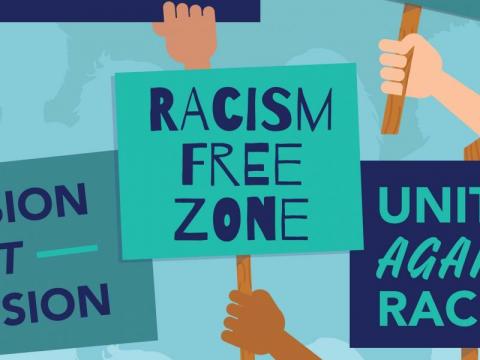
On March 21, 1960, sixty-nine people were killed and 180 were wounded after police opened fire at a peaceful demonstration in Sharpeville, South Africa, against the apartheid “pass laws.” A few years later in 1966, March 21st was proclaimed the “International Day for the Elimination of Racial Discrimination” by the General Assembly of the United Nations (UN).
A long road ahead
The United Nations has made the theme for March 21, 2019: Mitigating and countering rising nationalist populism and extreme supremacist ideologies.
Racially and religiously motivated attacks by White supremacists, national populists and racist extremist movements are on the rise in Canada and abroad. These groups have become more openly vocal and violent as demonstrated by the racially and religiously motivated attacks on mosques, such as Christchurch in New Zealand, Quebec City, and more. All around the world including Canada, anti-immigrant and anti-refugee agendas are openly promoted by right wing political parties and there is a refusal to name and denounce these acts of hatred for what they are – racist, Islamophobic and xenophobic.
Indigenous peoples continue to face violations of their basic human rights. Many of the Truth and Reconciliation Committee calls to action still lack any meaningful plans of implementation; meanwhile, indigenous women and girls continue to go missing, adequate water and housing continues to be inaccessible, and the child welfare system continues to fail many indigenous children.
There is still a long road ahead toward realizing the elimination of racism and racial discrimination. Racism and racial discrimination can also manifest itself in less overt ways including, but not limited to: systemic racism, institutionalized racism, micro-aggressions, etc. Racialized and Indigenous workers continue to be underrepresented in full-time positions in many workplaces and are overrepresented in precarious positions, while still being disproportionately represented in the criminal justice system and more negatively portrayed in the media.
PSAC’s advocacy work
PSAC has long been a strong advocate for equity and for the elimination of racial discrimination in the workplace.
In today’s political and social environment, it is more important than ever to remember that gains have been made with the support of the labour movement. In the 1960’s and 1970s, PSAC was among other unions in the labour movement to call for human rights and employment equity. And in the 1980s, the Canadian Labour Congress, PSAC and other unions were strong advocates of employment equity in the Task Force on Equality in Employment. The Task Force resulted in a groundbreaking report which clearly stated that legislation was needed to ensure equity in the workplace.
Most recently, in February 2019, PSAC provided a submission to the federal government on their anti-racism strategy and to the review of regulations to the Employment Equity Act. The submission urged the Federal government to make a strong commitment to employment equity, accessible and transparent staffing processes and reconciliation with the Indigenous community.
The attached time line provides a more robust snapshot of PSAC’s work in the fight against racial discrimination.
PSAC, along with the labour movement, will continue to stand in solidarity with racialized and indigenous communities – whether in the workplace or in the communities.
Let’s take action
March 21 is the day to reflect on past injustices and struggles that racialized and Indigenous peoples have faced. It is also a time to honour the activists, including labour activists, who continue to fight against inequality and racial discrimination.
PSAC calls on all its members to take part in local activities at work and in their communities that celebrates and commemorates the Day for the Elimination of Racism and Racial Discrimination. Members are encouraged to use the attached poster to give a clear message:
| Attachment | Size |
|---|---|
| 850.65 KB |
Updates
Featured on homepage:0
